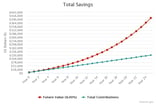Rivian (RIVN 6.1%), one of the most popular electric vehicle (EV) companies, has revved investor enthusiasm since its public market debut in 2021, when Rivian stock first became available to Main Street investors. Electric cars have become an increasingly common sight on the nation's roads. However, EV pickup trucks, like those manufactured by Rivian, are not so common, leading investors to believe Rivian stock can power higher if the company effectively executes its growth initiatives.
Whether you're an investor who is generally bullish on EVs or you're generally interested in growth opportunities, Rivian is a compelling consideration. Let's look at the steps needed to park Rivian stock in your portfolio and some things to consider before investing in the EV maker.
How to buy
How to buy Rivian stock
Regardless of whether you're familiar with how to invest in stocks or if buying shares of Rivian would be your first time behind the wheel, there are some basic steps to gain exposure to Rivian, which trades under the stock ticker RIVN.
Stock Ticker
Step 1: Open a brokerage account
Before you decide to power your portfolio with Rivian stock, you must have a brokerage account. With its $0 commission for online stock trades, Fidelity is a common consideration, but there are plenty of other options.
Step 2: Figure out your budget
Successful investors think carefully about their finances before clicking the buy button. Maybe you'd like to open a small position and add to it over time; maybe you'd be more comfortable with a larger single purchase. Regardless of your choice, be sure to choose an investment amount that won't result in sleepless nights if the stock heads south.
Step 3: Do your research
Time to dig deep and determine whether picking up shares of Rivian is a good move. You'll want to consider the company's financials and examine its strengths, weaknesses, opportunities, and threats (SWOT). And, of course, you'll want to look at the stock's valuation.
Step 4: Place an order
You've done your due diligence. If you like what you see, it's time to click the buy button and become a Rivian shareholder.
Should I invest?
Should I invest in Rivian?
There are a variety of reasons investors would choose to plug into Rivian's stock. For one, Rivian offers exposure to a leading name among those in the burgeoning EV industry. Car and Driver magazine, for example, characterizes the Rivian R1T as "one of the most capable EVs ever," and Consumer Reports proclaimed the R1T as "a cutting-edge, all-electric pickup with an impressively wide repertoire of capabilities."
For investors motivated to buy American, Rivian will also be a more desirable choice than other EV names. Headquartered in California, Rivian is a U.S. company that counts Amazon (AMZN 3.43%) as its largest shareholder.
In addition to a production facility in Illinois, Rivian is developing a plant in Georgia. Other popular EV names don't offer the same type of opportunity. For instance, people considering Lucid (LCID 0.41%) stock might be dissuaded by Saudi Arabia being the company's largest investor and Lucid's building of a manufacturing facility in the country.
Another consideration is your risk tolerance. Although Rivian has achieved success, the road ahead is not guaranteed to be smooth. Likening Rivian to another innovative EV company, some investors presume Rivian will be a multibagger like Tesla (TSLA -1.11%) stock. But this is far from the case. The two companies differ in many ways, and Rivian's stock could slide and not recover.
Lastly, investors looking for a stable stock should look elsewhere. As an upstart company in the early innings of its development, the stock will likely experience some volatility in the days ahead -- not something for the faint of heart.
From the time of its initial public offering (IPO) through the end of 2023, for example, shares of Rivian dropped 77%. Sure, they could recover and soar higher than their debut on the public markets, but it could be a rocky road until they get there.

Profitability
Is Rivian profitable?
Rivian began generating revenue in 2021 when it reported $55 million on the top line. The bottom line, however, didn't provide much for investors to celebrate -- a net loss of $4.7 billion.
In 2022 and 2023, Rivian's sales accelerated considerably. After delivering 920 vehicles in 2021, Rivian delivered 20,332 vehicles in 2022 and 50,122 vehicles in 2023. This led to the company reporting revenue of $1.7 billion and $4.4 billion in 2022 and 2023, respectively. However, the company failed to achieve comparable growth in terms of profits. In 2022, Rivian reported net losses of $6.8 billion in 2022 and $5.4 billion in 2023.
Charging up investors' hopes that some semblance of profitability is not far down the road, management said in its 2023 fourth-quarter shareholder letter that it "expect[s] to achieve modest gross profit in the fourth quarter of 2024."
Dividends
Does Rivian pay a dividend?
At this point, Rivian doesn't pay a dividend to shareholders. The company only recently began to generate revenue, and it's committed to using capital to grow its operations, such as the new manufacturing facility in the Peach State. Rivian estimates that when the company's second manufacturing plant is complete, it will have an annual production capacity of 400,000 vehicles.
In all likelihood, it'll be some time before Rivian decides to reward shareholders with a dividend, considering how the company is neither profitable nor generating organic cash flow.
Exchange-Traded Fund (ETF)
ETF Options
ETFs with exposure to Rivian
Investors can also gain exposure to Rivian through investing in an exchange-traded fund (ETF) that counts the carmaker among one of its holdings. The First Trust NASDAQ Clean Edge Green Energy Index Fund (NYSEMKT:QCLN) is a lithium-focused ETF that invests in various companies that operate in different areas of renewable energy. Rivian's position in the First Trust NASDAQ Clean Edge Green Energy Index Fund is sizable; it was the fifth-largest holding as of September 2023.
Another promising consideration is an electric vehicle ETF like the KraneShares Electric Vehicles & Future Mobility Index ETF (KARS 2.3%). Although Tesla stands as the largest holding in the ETF, Rivian also plays a major role, representing the ETF's 10th-largest holding of 58 overall positions as of March 2024.
People looking for an ETF in which Rivian represents a major holding, however, should turn to the ALPS Clean Energy ETF (NYSEMKT:ALPS). With a moderate 0.55% expense ratio, the ALPS Clean Energy ETF is mostly geared toward EV stocks, although it also includes solar, wind, and hydrogen stocks among its holdings. As of March 2024, Rivian was the ETF's largest position, with a portfolio weighting of 5.9%.
Stock splits
Will Rivian stock split?
A company will often choose to split its stock when it feels the share price is so high that it's keeping some investors from buying it. Although there are a variety of upcoming stock splits in 2024, Rivian -- which hasn't traded higher than about $25 in 2024 -- isn't one of them.
Related investing topics
The bottom line on Rivian
A leading name among EV stocks, Rivian's prospects have electrified the hopes of many investors, leading them to believe Rivian stock can charge considerably higher like its EV peer, Tesla. But it's hardly that simple.
Before buying Rivian stock or an ETF that counts Rivian among its holdings, investors must be comfortable with the stock's risk profile and the prospect that volatility may rattle their nerves in the future.
FAQ
Investing in Rivian: FAQs
Are Rivian shares a good investment?
Since everyone's situation is unique, it's impossible to categorically declare that Rivian is or isn't a good investment. Individuals must consider their risk tolerances, investing time horizons, and various other factors before determining whether Rivian is a good investment for them.
Broadly speaking, Rivian is a compelling opportunity for EV investors who are comfortable with a fairly speculative investment. At the end of the day, it's critical for individuals to take a comprehensive look at their particular situations and to dig deep into the company before deciding to buy the stock.
What will Rivian stock be worth in five years?
Rivian's stock ended 2023 at $23.46. If the stock returns the historical 10% annual average growth of the S&P 500, shares of Rivian will be changing hands at about $38 in five years.
Of course, Rivian's stock is not guaranteed to follow this trajectory. If Rivian develops its new manufacturing facility in Georgia and the company meets -- or exceeds -- its target of producing 400,000 vehicles annually, the market could send the stock considerably higher.
Is Rivian publicly traded yet?
Founded in 2009 by Robert Scaringe, who currently serves as the company's CEO, Rivian was a privately held company until its November 2021 IPO, when it began trading at $78.
































































































































































































































